Keywords
attitude, perception, marketing, strategy, health services.
Introduction
One of the most misunderstood concepts in Greece is without a doubt the concept of marketing, where many believe it is mainly advertising. For a great number of businesses marketing at best is a “scientific” way to present a company’s products and to boost sales (Hooley et al, 1990). The inability in understanding what marketing really is, by executives that are asked to practice it, is by no means an accident. Even between the researchers in the field we observe great divergence in what they think marketing is (Kohli and Jaworski, 1990).
Nevertheless, renowned and accomplished researchers (Narver and Slater, 1989) in the field have pointed out that the direction towards marketing is part of the synthesis of a culture of business. In the beginning marketing was established as a field in applied economics, devoted to the study of the networks of distribution. Later it developed to an administrative method of increasing sales. Following this, it took on the character of an applied behavioral science that is interested in understanding systems of supply and demand in products and services (Papadimitriou, 1998). The concept of marketing has expanded so much, that it can now be used not just in companies but in every organization or social group that owns a product (material or intellectual) or service.
The important changes in the international economic chessboard in the 80’s decade did not leave the field of health unaffected. The USA as a pioneer started to develop dynamically a new trend in the area of marketing services, marketing health services. Twenty years later almost all of those involved in the field of health can indicate a marketing department in their flow charts. Europe and the rest of the world were late bloomers. The enactment and application of L.2889/01 that establishes belatedly the area of Greek hospitals and their function as an enterprise and health organization, resurfaces from its gamma of executive tools of logical and sophisticated management marketing. In a contemporary environment of modern executive applications, marketing and its distinguishable role contributes to the supply of complete health services, maintaining the quality, and monitoring the cost of health services.
The vast majority of research (Klimis, 2002) till today on marketing in the field of health are focused on the private sector concerning the satisfaction of the patients and the services provided (Papanikolaou and Sigalas, 1994). Research is also made on attitudes towards marketing, how it is perceived and the capabilities of the health professions that are related with the use of this enterprising tool. The results from international research (Anderson, 1987) have shown that it is possible to recognize the attitude that the health care personnel have towards marketing. The current study explore the recognition and investigation of these attitudes of health executives in order to determine the necessity of modern marketing strategies in health services and to detect the main realistic Greek conclusions.
Aim
The aim of this study was to approach marketing conceptually and to specify it for a health environment and then to research the attitude of health executives, as to, the use of entrepreneurial activities and marketing techniques in their sector.
Methodology
Data were collected by 9 out of the 36 hospitals of the Regions of Health Council (H.Re). Four hundred and fifty (450) upper health executives from the three basic fields of services in hospital institutions (medicine, nursing, administration) constitute the research sample.
The selection of the sample of research was made taking into account that it may be considered a random representative sample of whole population.
The only criteria in selecting the sample was that every person participate in the research had to have a permanent position in the executive hierarchy in the department. A total of 496 questionnaires were distributed, (159 at the hospitals of H.Re Α, 161 at the hospitals of H.Re Β and 176 at the hospitals of H.Re C. 27 questionnaires of these were not returned completed and 19 of the questionnaires that were answered were not included in the statistical analysis because they were half completed. So, from the 496 health executives that consented initially to take part in the research only 450 people took part (percentage 90, 7%).
Research Tool
The research tool was a questionnaire that was titled “Attitudes and perceptions of health executives on marketing in health”. The questionnaire had two sections. Section I, included 8 questions (questions 1-8) of which 3 collected information on the sex, the age and the level of education of those questioned. The remaining 5 questions of the first section concerned the nursing institution in which they were employed and also the information concerning their work situation (department to which they belonged, exact position in the hierarchy, years worked in current position, years worked in healthcare).
Section II, consisted 21 closed questions searching about the attitudes and perceptions of the people in the sample about marketing as activity in the area of health. Hospitals’ health executives were drawn to express their degree of agreement or disagreement with the specific proposals on a 5 point Likert-type scale. The 14 of the 21 conditions of the tool (questions a, b, c, d, e, f, g, h, I, j, k, l, m, n) represent positive perceptions and were coded in this manner: 5 agree completely, 4 agree in part, 3 don’t agree or disagree, 2 disagree in part, 1 disagree completely. Completely opposite, the remaining 7 conditions(questions o, p, q, r, s, t, u) concerned negative perceptions and the code was: 1 agree totally, 2 agree in part, 3 don’t agree or disagree, 4 disagree in part, 5 Disagree totally.
Results
The total sample of the study constituted 450 higher administrative executives from 9 hospitals of 3 H.Re in Attica. These executives come from three services of hospitals that were included in the study: medicine, nursing and administrative. The 2/3 approximately of higher executives that took part in the research were woman (n=291, percentage 64,7%) and 1/3 men (n=159, percentage 64,7%). Most executives were under the age of 40 (n=267, percentage 59,3%). Most of them belonged to the age group 40-50 (n=154, percentage 34,2%) and some were 51 years and over (n=29, percentage 6,5%).
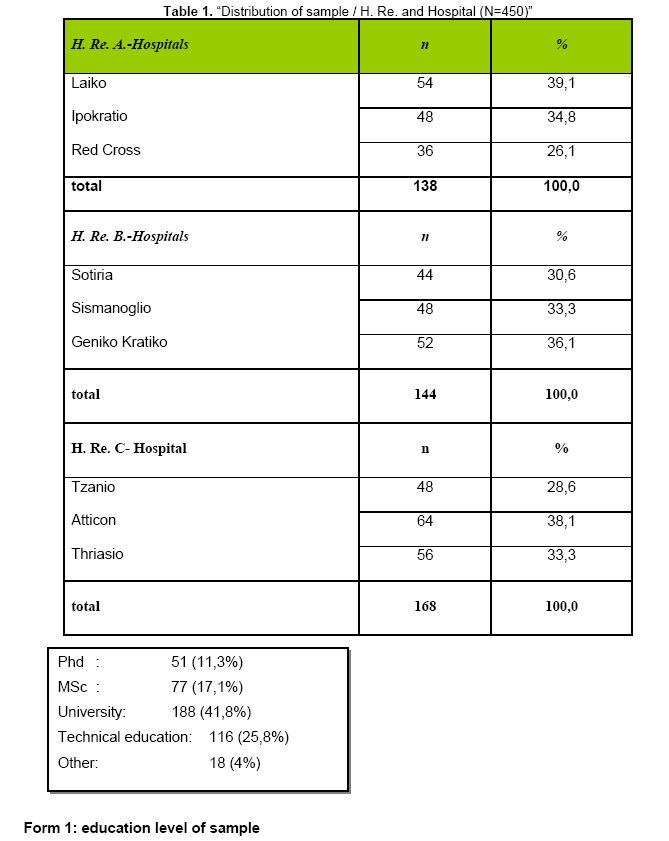
Regarding to the present position of the individuals in the sample (table 2), most executives belonged to the nursing service (n=198, percentage 44%), followed arithmetically by the executives administrative service (n=159, percentage 35,3%) and the executives of the medical service(n=93, percentage 20,7%). As to years of work experience, 159 (percentage 35,3%) declared that they had less than 10 years, 125 (percentage 27,8%) said they had 10-15 years and 166 (percentage 36,9%) said they had more than 15 years. Finally, half of the professionals possessed the specific position in hierarchy between 6 to 10 years (n=227, percentage 50,5%), a smaller number of those up to 5 years (n=178, percentage 39,5%) and one even smaller number from 11 to15 years or more from 15 years (n=24, percentage 5,3% και n=21, percentage, 7%, correspondingly).
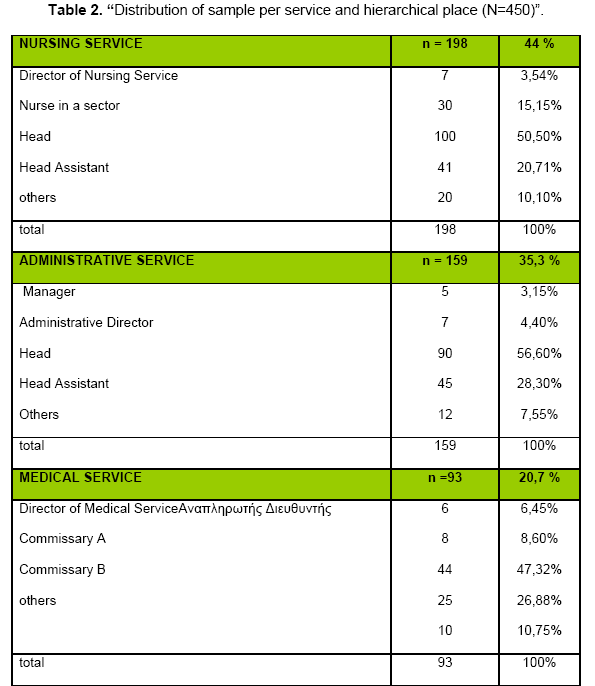
Perceptions of the Sample about Marketing
Most executives (n=216, percentage 48%) had favorable perceptions about the applications of marketing in health services, enough executives (n=193, percentage 42,9%) had mediocre perceptions, while one comparatively small number(n=41, percentage 9,1%) had a negative one.
As is evident by the positive conditions (positive perceptions) of the scale, higher values gathered the following acceptance: “Those studying hospital administration have to learn marketing so they will be better prepared in their carrier”. “The use of marketing by health professionals will have as a result a more positive reaction to the wants and needs of the patients”. “Most of my co-workers need more knowledge in marketing” and “Marketing will play a very important role in the future in healthcare”. In the opposition the positive statements about marketing that received the lowest values were: “Marketing is a field that I know” and “I am using concepts of marketing in my practice, at the hospital or the organization were I work”.
From the statements of the scale that did not have a favorable stance for the use of marketing in the health field, the lowest (most negative) values were observed at the following conditions: “I think it would be better if less emphasis were given to marketing by hospitals and health organizations”. “Marketing increases the bill that a patient has to pay for health care”. “Advertising and marketing is basically the same thing”.
Correlations between the Variables
The processing of all the data showed the sex and the age of administrative executives influenced their opinions about marketing. The women and older executives appeared to have a more positive stance compared to men (p=0,021) and younger executives (p=0,000).
The multiple comparisons that were made between different sub-categories of the population researched with the method Post Hoc Tests showed more statistical differences between perceptions about marketing and the other characteristics of the sample. According to the statistical analysis the opinion of administrative executives that partook in the research about marketing became more positive as the educational level increased. These differences were observed mainly between the four highest levels of education, e.g. Doctorate, Postgraduate study, Universities and Technical Institutes.
The score of the whole scale of perceptions (question 9a) were divided by 3 in order to create 3 corresponding categories: 78-105 positive perceptions, 50-77 mediocre perceptions, 21-49 negative perceptions. Next based on the value that was resulted and its answers, every individual in the sample was classified in the corresponding group. This specific categorization showed that most executives (n=216, percentage 48%) had favorable perceptions on the application of marketing in health services, quite a few executives (n=193, percentage 42,9%) had mediocre perceptions whereas a comparatively small number of these(n=41, percentage 9,1%) recorded a negative opinion. With Maximum possible value of the total scale 105 and Minimum possible value 21, the Average value was found to be 77,8083 (SD=11,9039, R=37-102). The Average values (χ), and the Standard deviations (SD) and the Fluctuations (R) for every one of the conditions of the scale of the perceptions are described in table 3.
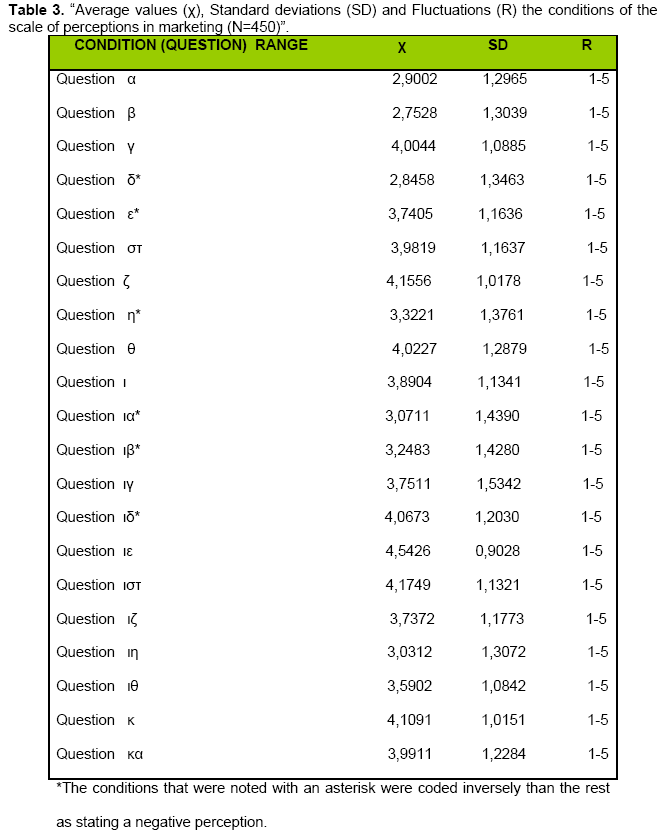
As we can see in the table 3, the positive conditions (positive perceptions) of the scale, the highest values were collected by the following declarations: “Students in hospital management should learn marketing in order to be better prepared in their by health professionals will have as a result a more positive response to the needs of the patients.” (question ιστ), “Most colleagues require more knowledge on marketing” (question ζ) and “Marketing will play an important role in future healthcare”(question κ). On the other hand, the positives declarations on marketing that received lower values were the following: “Marketing is a topic that I know” (question α) and “I use definitions of marketing in my work (question β).
From the declarations of the scale that do not state a favorable attitude in the use of marketing in the area of health, the lowest negatives were observed in the following conditions (table 3): “I think that it would be better to give less emphasis on marketing by the hospitals and the health organizations” (question ια), “Marketing increases the amounts that the patient has to pay for healthcare.” (question ιβ) and “Advertising and marketing are essentially the same thing” (question η). Question 10 corresponded to a catalogue of management activities which take place on a daily basis in various hospital institutions. The individuals in the sample were asked to pick and classify three activities that they felt were the most important for the successful function of a health organization (table 4). According to the perceptions of the sample the first positions in order of importance were taken by activities that associated with planning and bureaucratic procedure like personnel management and book keeping. Activities that concern the economic management of a health organization and the promotion of services and products that available were deemed of mediocre or low importance by the population in the study.
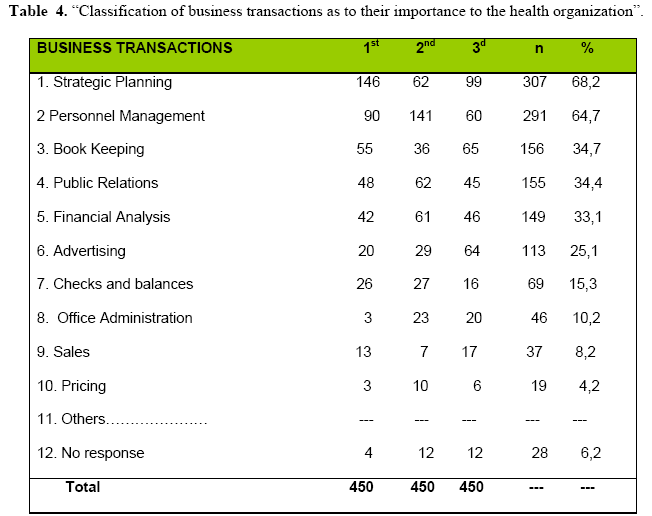
After processing the facts by using the method of fluctuation analysis and simple direction (ANOVA one-way) we resulted with many differences between the three groups of health professionals that took place in the research. The differences that were located between administration, medical and nursing executives in the partial conditions of the attitude measurement tool for marketing appear analytically in table 5 and 6. According to the facts in the specific table, the administration executives differed just as much to the doctors as they did to the nurses and declared that marketing a field that they know well. The administration executives differed also to medical executives as to the extent of the use of marketing concepts that they stated they do (declaration 9β) even though similar difference was observed between nursing and medical executives. As to declaration 9γ, the administration employees agreed more than the other professional groups that the health professionals should use modern marketing practices but the perceptions of nurses and doctors on the same issue was no different. The representatives of the medical field had a more intense belief compared to the representatives of the nursing and administrative field is that they don’t need greater familiarity with marketing than what they had to be successful at work (declaration ε).Nurses supported more intensely than doctors that the students of nursing had to have knowledge in marketing so that they are more equipped for their career (declaration στ). Compared to the nurses and the doctors, the administrators believed more that the use of marketing will contribute to professional success (declaration ι) so they simultaneously believed less compared to the nurses that the emphasis that is given to marketing by the health professions has to be decreased (declaration ια).
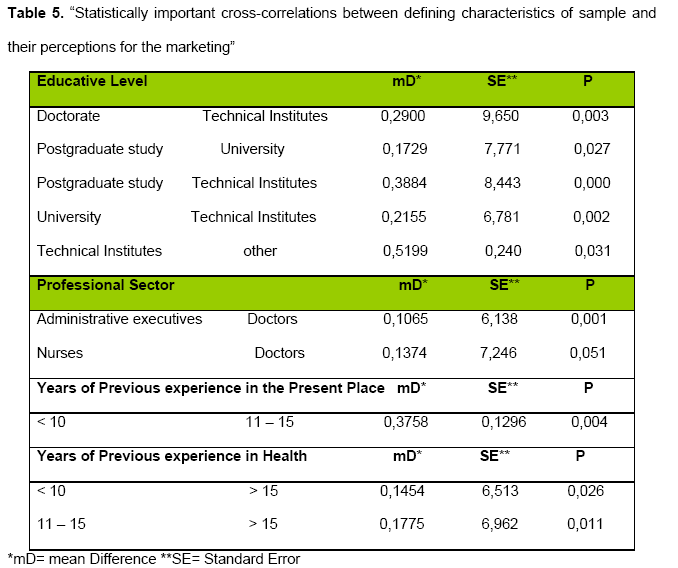
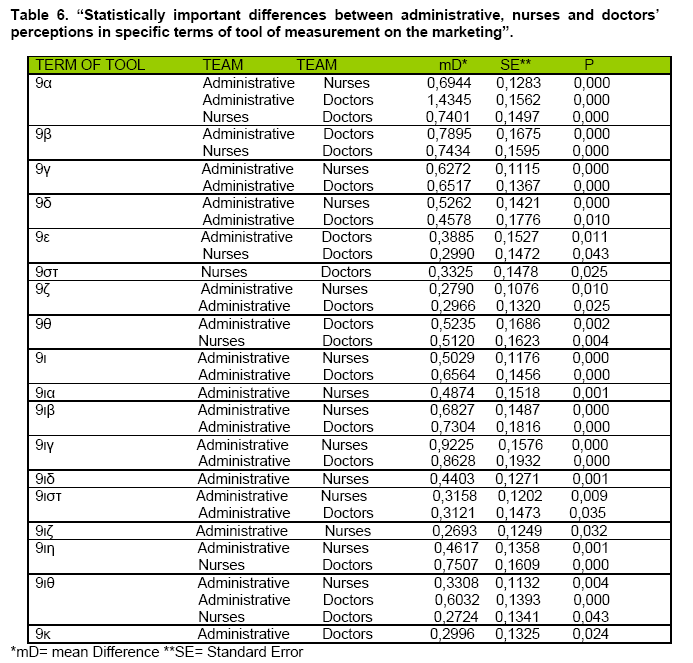
Nursing and medical executives had the same opinion between them, which differed in degree statistically to that of administrators, mentioning how much the application of marketing will increase the fees for patients (declaration ιβ) and also as to how it is easy or difficult to replace the communication the word “patient” with the word client (declaration ιγ). The administrators seemed to believe more that one should invest their time to learn about more marketing (declaration ιδ) whereas all three groups seemed to agree equally that the education of nursing students should provide them with the necessary knowledge on marketing to better prepare them for their professional success (declaration ιε).
The administrative executives were found to believe more than nursing executives that the application of marketing will have as a result a more whole coverage of the needs of patients (declaration ιστ) while they simultaneously stated more intensely than nursing their belief that marketing will increase the total level of satisfaction of the patients from health services provided (declaration ιζ). Nursing more than medical and administration personnel agreed with the perception that supports that marketing will decrease the dominance of the medical profession in the field of health (declaration ιη). Statistically significant differences were observed between the three professional groups relatively to the opinion that was expressed and to the extent to which marketing will be used in health organizations simply to attract patients-clients (declaration ιθ). This position was stated more intensely by nursing followed by medical and then administration. Compared to medical, administration employees had a more favorable opinion that marketing will play an important role in healthcare in the future (declaration κ) whereas no difference was pinpointed between the representatives of the three services as to their opinion on the necessity of acquiring knowledge on marketing by the students in medical science.
Comments of the Sample on marketing
In the last question of the tool (question 11), which was in open form, it was asked by administrative executives to express freely their opinion on marketing and to record any comments concerning it. By the 450 individuals in the sample 94 (percentage 21% approximately) responded to the specific question. The answers that were given present a pluralistic perception on the subject which is very interesting. After the statistical analysis, the comments of the population researched were classified into 5 groups of answers based on the content of the answers. The greatest group of answers (Α1, n=31, percentage 32,9%) mirrored an initial positive stance towards marketing but also simultaneously declared concerns on the application and the results or set restrictions to its applications. Common comments were the following: “If marketing is not considered “the solution” to all the problems in health and is applied in small dosages, only then can it contribute to the reduction of costs in healthcare and bureaucracy. But because many things in our country are applied with no planning, I fear that marketing may affect negatively the quality of care that is offered today.”
“I believe that marketing is the phenomenon of the modern age. Before we are quick to jump to conclusions, we should wait and see the results of its applications.”
The second numerical group of answers (Α2, n=22, percentage 23,4%) was the one that stated an obvious negative perception to marketing and the dangers that await in its implementation in the field of health. Among the answers that represented this attitude were:
“Marketing mirrors the materialistic philosophy to modern society which has as permanent goals the acquisition of wealth and a comfortable lifestyle in life independent of the price one has to pay.”
“I find it difficult to use words such as “enterprise” for the hospital or “client” for the patient. Such words have no warmth. They are cold, impersonal and empty to emotions of sympathy, and helping one another and love.”
“Health and education are basic responsibilities of every nation and should be offered free of charge.”
Quite a few of the rest of the individuals in the sample that answered to the open question (Α3, n=17, percentage 18,1%) they expressed an opinion that mirrored the absence of relation between marketing and health or a limited perception of the subject. Some of the comments, for example were the following:
“Marketing concerns only the economists, and politicians and those that are responsible for hospital administration. Those that are concerned with patient care should keep away from marketing.”
“They are two different things. Medicine is based on the human and the values of life and health, whereas marketing on finance and the increase in profit.”
A few in comparison administrative executives (Α4, n=15, percentage 16%) that adopted a favorable opinion on marketing without stating simultaneously fears or hesitations. This perception was recorded clearly in comments such as:
“Marketing is a very promising method of managing and governing hospitals and has the ability and has the ability to offer important benefits in the area of health.”
“The development of modern systems of Management in the area of Public Health is related totally to a national plan of Marketing (in 4Ρs) in macroeconomic level and partial Marketing Plan that will be completed to express goals of Districts and Units (e.g. Hospitals). Unfortunately we are very far from the perception marketing in our workplace this is why the Greek health system continues to be unreputable and anti-productive.”
Finally, a small number of individuals (Α5, n=9, percentage 9,6%) let it be known with their answers that there is nothing different in marketing from what was applied in the area of health or stated inability to record a personal opinion because of lack of insufficient information on the subject.
Discussion
The study presented the perceptions of nursing, administration, and medical executives. By evaluating the results on the whole we conclude that the executives of administration, medicine, and nursing services that took part in the present study appeared to have a positive attitude on marketing and its implementation in the different health organizations. This becomes apparent by the fact that an extremely high percentage of the participants in the research agreed that marketing is an activity that needs to definitely be applied by health professionals. Also the majority of the people in the sample agreed that marketing will play a major role in the future in the accomplishment of the health organization’s goals. The positive opinion that the population in the research had is supported by the fact that there was no great agreement with the conditions that mentioned that marketing will decrease the dominance of the medical profession or that it will be used as a medium to attract patients.
The statistical processing of data and specifically the study of the differences between the perceptions of the three different professional groups that were tested highlighted some issues that are consideration and further discussion. First, the executives of the administrative services appeared to be more familiar with marketing and had a favorable perception concerning it than the executives in medicine and nursing in health services. Second, the perceptions of medical and nursing services were found to be more identical between them, even though nurses seemed to be more informed on the subject and apply marketing practices more often than doctors. Third, the general attitude of doctors and nurses on the issue at hand was distinctly influenced by a humanitarian approach to the executives of the administrative service whose opinion it was obvious had received influences by the entrepreneurial model. Fourth, the doctors were found to hold a greater distance and to harbor great apprehension towards marketing than the other two professional groups. This finding is derived –among other things- and from the perceptions of doctors on the benefits of marketing in their professional success but also in the need to educate medical students on issues of marketing. Fifth, it was obvious that the attitude of the participants on the whole mirrors the stereotypical perception according to which marketing is an activity that concerns the employees in administration and less those representing the medical and nursing sector of hospital services. Sixth, the perceptions of nurses were found to balance between the perceptions executives in administration and the perception of those in medical administration. This fact justifies what Greek and international bibliography supports (Melleis, 1997; Patistea and Vardaki, 2001) that nursing services are trapped between the duality administration-medical services and bound by the power it exercises. This situation without a doubt comes at a great cost to the nurses professional autonomy and self-reliance and the recognition of their contribution to the society’s health as a whole.
In a similar research by Anderson and his associates (1987), the opinions of the upper health executives that participated on the benefits of marketing were not clear or homogenous. So, even though they agreed that marketing will definitely contribute in providing total health care to patients, and in the degree to which they are satisfied by the health care services, they recorded intensely their belief that marketing will increase the cost of healthcare.
A great problem that was mentioned by professionals was the extent to which marketing was used in their daily practice. Most of them admitted that their knowledge on marketing is not satisfactory, and they do not apply practices of entrepreneurial marketing in their work. This research finds itself in opposition to the research by Anderson and his associates (1987) in which they presented from their sample higher levels of familiarization with the concepts of marketing and a greater extent of application of its strategies. The difference between the two researches may be attributed to the fact that marketing had been introduced dynamically in the USA in the early 80’s, whereas; in Greece it has been implemented for a short period of time. The deficient knowledge on marketing and it’s insufficient application may explain the reasons why in the present study, it was observed (a) great willingness of the executives in the sample to take part in seminars to increase their knowledge on the topic and (b) a significant degree of agreement to educate the students in the health profession on subjects in marketing.
What is interesting, though, is the dichotomy that was depicted between opinions that agreed to observe seminars and the opposing opinion in devoting time to it because it is not worth the effort. One more problem that was found was that concerning the limited understanding of health executives on marketing. A significant number of the people in the sample considered that marketing is an activity identical to advertising and a greater number expressed the opinion that marketing is synonymous to sales.
Conclusively and based on the responses in the sample, health is described as a gift that the state is obligated to offer freely and this position is abides with the philosophy social service and assistance on which the health system of our country has been based on until recently. The specific perception of health as a “social gift” for which the government is responsible so that the processes of its efficiency and its availability are keeping up with the social and economic criteria that have been described and analyzed in detail by the scientists that are concerned with the finances in health (Theodorou et al, 1998; Kotrotsiou E, 2002)
3646
References
- Anderson D, Elbert D, Fickensher K. (1987). Health Care Marketing: Opinions of providers” Economic Studies, University of North Dakota, North Dakota.
- Hooley G, Lynch J, Shephard J. (1990). The marketing concept: Putting the theory into practise. European Journal of Marketing: 24(9):7-23.
- Klimis S. (2002). The distinguished role of marketing in strategy, planning and provision of complete health services. Unpublished Master Thesis, Marketing and communication Department, Economic University of Athens, Athens.
- Kohli AJ, Jaworski BJ. (1990). Market Orientation: The Construct, Research Propositions and Managerial Implications”. Working Paper, Marketing Science Institute, Cambridge, Massachusetts.
- Melleis AI. (1997). Theoretical nursing: Development & progress. Lippincott, 3rd ed. Philadelphia.
- Narver JC, Slater SF. (1989). The effect of Market Orientation on Business Profitability”, Marketing Science Institute, Cambridge, Massachusetts.
- Papadimitriou Α. (1998). Principles of Marketing. Ed Papadimitriou, Athens.
- Papanikolaou Β, Sigalas J. (1994). Patient satisfaction as a quality indicator of nursing care. Conference Proceedings “Application of Management of Total Quality in the area of health services” 4-6 November, Salonica.
- Patistea E, Vardaki Z. (2001). Clients' and nurses' perspectives of caring as related to nursing leadership. The Hellenic dimension, Part Two, Canadian, Journal of Nursing Leadership: 14(4): 26-35.
- Theodorou Μ, Sarris Μ, Soulis S. (1998). Health Systems and Greek reality. In Soulis S. (1998 ).“Economics in Health”, eds. Papazisis, Athens.
- Kotrotsiou E (2002):Differentiation and Guarantee of Quality in products and services of health. Nosileftiki 41(3): 288-294.











